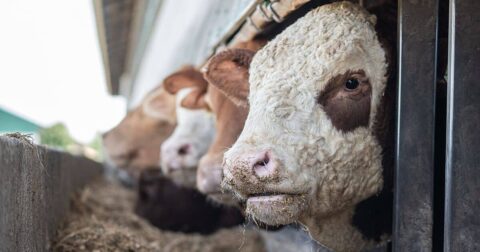Explainer
Why Eating Organic Isn’t a Climate Solution
Climate•8 min read
Reported
One of the world's most prestigious universities made a pledge to go meat-free but the reality has been far from sustainable.


Words by Catherine Oliver
The University of Cambridge announced it would be “closing a chapter on meat” this past summer. Since July, the school’s library tearoom began requiring food service providers to limit the number of beef and lamb dishes on the menu, part of a broader campaign at the University to curb food-sector carbon emissions by reducing how much meat — especially ruminants — is served.
When I applied for my job at Cambridge in 2020, I was excited to be part of a university with what seemed like a forward-looking food and climate agenda, but my hopes for it were quickly dashed. As I experienced my first meals and events at Cambridge and its colleges, I was struck by just how much animal meat, including beef and lamb, was on offer throughout Cambridge’s 31 colleges, and the relative invisibility of vegan options despite the adoption of a sustainable food policy in 2018.
Looking at recent and sample menus, there certainly is some vegan food available (and, thankfully, it is labelled), but these few plant-based dishes haven’t managed to replace the vast amounts of meat and dairy still served to students and faculty.
On one month of menus from August are racks of ribs, bacon steak and beef casserole. During university exams in May, Cambridge’s largest and richest college, Trinity, offered lunches of beef carbonnade and lamb hotpot, while Clare College served up beef lasagne alongside chicken dishes.
The smallest college, Peterhouse, consistently serves up imaginative vegan mains of seitan doner and celeriac schnitzel, but these are dished up right next to madras spiced beef and piri piri chicken. Emmanuel College students feasted on a vegan dinner at formal meals during the University’s “green week.” But just across the room, at what is called the high table where academics are seated, plates were piled high with “premium cuts of beef.”
What is impossible to know from these menus is the uptake of people opting in or out of animal proteins, as colleges do not share this kind of data to evaluate their climate efforts. While the University reports that their purchasing shifts resulted in a 33 percent reduction in carbon emissions, there is little transparency about how this was achieved and whether it has been sustained.
Presenting these current efforts as a definitive turning point in the university’s climate efforts does a disservice to net zero carbon commitments, as well as local and international researchers working to make that happen. Offering “low carbon” meals as part of menus that feature beef or dairy throws into doubt the seriousness of these efforts, especially given the evidence we have about how ruminant farming damages the environment.
Providing a few meals without meat is doing little to foster a true cultural shift to recognize that changing the way we eat is the best tool we have to fight climate change. It isn’t that people don’t care about the climate, but that dining at the university is viewed as a luxurious treat, and the consequences outside of those walls still seem far away.
Based on my review of sample and actual menus at the Colleges, where the vast majority of meals are eaten by students and academics, I haven’t found a single menu where ruminant meat is absent, despite their adoption of a sustainable food policy in collaboration with the university in 2018. But even if it were, this is no guarantee of an environmentally “sustainable” meal, to say nothing of the ethics of eating animals.
By only focusing on emissions, the menu might include factory farmed pork or chicken that contribute to water and air pollution. George Monbiot recently argued that organic, pasture-fed beef and lamb are the most damaging food products. But lower carbon meats like industrially farmed chicken are farmed in a way that’s much worse for the animals. Meanwhile, increasing the welfare of chickens without changing our consumption would require turning over vast swathes of lands to livestock farming, decimating both soils and the atmosphere in the process.
Cambridge’s carbon campaign has allowed them to capitalize on the greenwashing of their menus, but my time there has seen little in the way of commitment to the radical change needed for both the climate and animals.
Eating indulgent meals in these historic settings makes clear that Cambridge’s carbon campaign hasn’t done much to change the conversation about the food and animals we eat.
There is a wealth of evidence that shows animal agriculture is not just disastrous for the climate but also biodiversity and labor rights — yet one of the world’s leading universities is still failing to grapple with the urgency of dietary change.
If Cambridge is serious about cutting their carbon emissions and becoming a leader in climate crisis mitigation, they need to do more to reduce their part in emissions from animal agriculture. For now, their commitment falls drastically short — on both environmental and ethical grounds.
This piece has been updated.